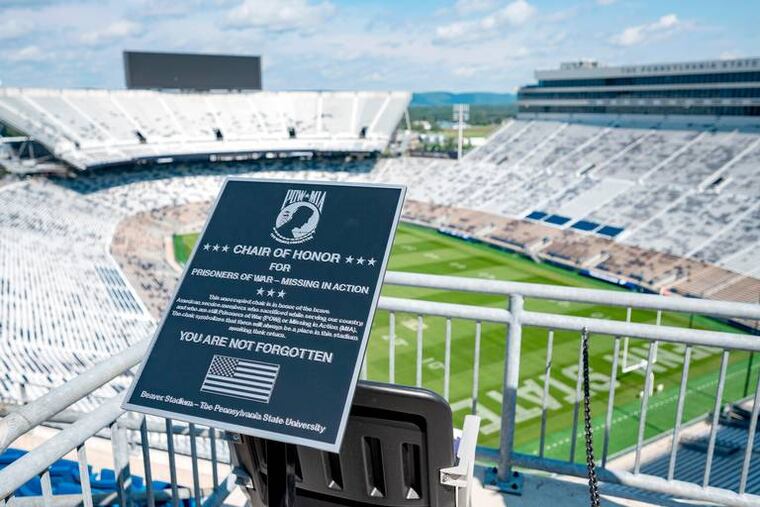An empty seat will honor the military during Penn State home football games
A black seat, in stark contrast to the blue chair-backs and silver bleachers that populate the Nittany Lions' football stadium, has been formally dedicated as the POW/MIA Chair of Honor.

STATE COLLEGE, Pa. — A black seat, roped off from others inside Beaver Stadium, will sit empty this Saturday. And the next Saturday. And every remaining Saturday, indefinitely.
The dark seat, in stark contrast to the blue chair-backs and silver bleachers that populate Penn State’s football stadium, was formally dedicated Wednesday as the POW/MIA Chair of Honor, referring to those veterans either taken as prisoners of war or missing in action. A marker behind the seat in the SLU section of the upper concourse reads, in part, “This chair symbolizes that there will always be a place in this stadium awaiting their return.”
The empty seat will be unveiled to the public during halftime of Saturday’s Penn State-Ball State football game, which kicks off at 3:30 p.m.
“This chair will be a visible reminder of all those who are missing from our families and our communities,” university President Eric Barron said. “The empty seat will honor the prisoners of war and service members who are missing. Remembering our missing service members will reinforce our commitment to bringing everyone home.”
University officials and area politicians — such as U.S. Rep. Fred Keller, R-Kreamer, and Rep. Glenn Thompson, R-Howard — attended the hour-long ceremony, which featured the Blue Band, four speeches and the ROTC Joint Service Color Guard. A sister of one local Vietnam vet, a Bellefonte native and Penn State alum, wiped tears from behind her dark sunglasses while “Amazing Grace” played softly, as a red rose and American flag were placed on the dedicated seat.
Debra Burger — the youngest sister of Major Lewis P. Smith II, whose body has still not been recovered — intimated that this moment has been a long time coming. And she was pleased she finally got the chance to see it.
“This chair stands as a representation for all those who did not return from answering our nation’s call,” Burger said with a steady voice, later adding, “Our family would like to thank you for allowing this chair to properly display and have it take a place of honor in this stadium as a daily reminder of the POW/MIA issue to all who visit here.”
Wednesday’s dedication was a moment 7 years in the making, ever since Burger first approached the university about the idea. Officials immediately jumped on board but, between changes in leadership and the impact of the Jerry Sandusky scandal, the idea was put on the back-burner until 2017. After more planning, and the help of the University Park Undergraduate Association, the seat was poised to be dedicated in 2020 — until the COVID-19 pandemic hit.
So, after several delays, officials said it was only appropriate that the POW/MIA Chair of Honor was finally set to be unveiled Sept. 11, six days before the national POW/MIA Recognition Day, which honors the 82,000 American veterans whose remains have never been recovered.
“To these brave Americans who have sacrificed so much in service of our nation, we will never forget,” said Eugene McFeely, senior director of the university’s Veterans Affairs and Services, who helped renew interest in the project in 2017. “And you are not forgotten.”
» READ MORE: Penn State is again recognized for being LGBTQ-friendly
Wednesday’s dedication took on a somber tone, especially toward the end of the ceremony when Burger recalled in painful detail how many times the hope of finding her brother’s remains was dangled in front of her — and how many times it was taken away. At least two officials in the front row wiped away tears as she recalled how his Air Force crash site was likely found, his Penn State class ring recovered, excavation poised to start — and then how the site was found underwater because of monsoons.
She’s still waiting for word on her brother’s remains. More than 50 years after she last saw him. The next opportunity for excavation could come in 2022.
“My head knows what I should believe, but my heart is still holding on,” Burger managed. “For our family and all those like ours, the not knowing is the hard part.”
Barron and McFeely noted Penn State’s strong ties, historically, to the military, explaining Wednesday’s dedication was simply a continuation of that tradition. Even James A. Beaver, a former university president and state governor whom the stadium is named after, served as a colonel in the Civil War and was wounded on four different occasions. Penn State is also currently one of the leading research universities associated with the Department of Defense, as it conducts about $200 million annually in defense-related research.
As a result, officials intimated Wednesday’s dedication was long overdue.
“This Chair of Honor represents not only the missing service members, but it serves as a symbol to service members’ families that we’ll never forget their loved ones and will continue to work tirelessly until every man is brought home,” added Col. Laura McHugh, deputy adjutant general (Army), of the Pennsylvania National Guard.